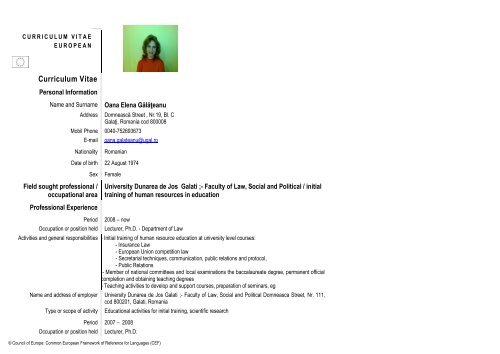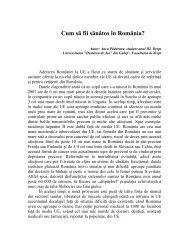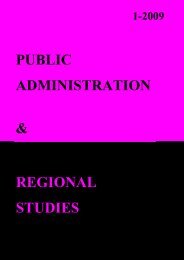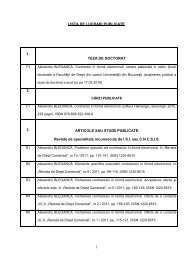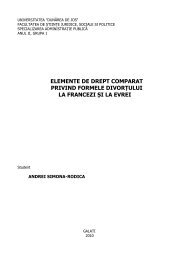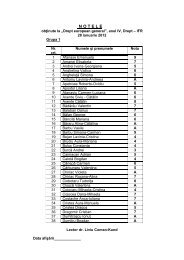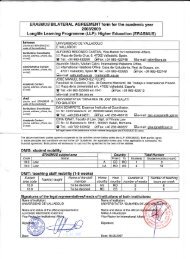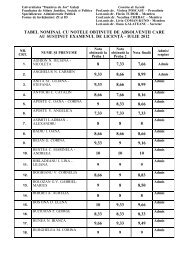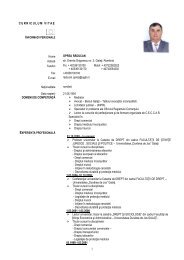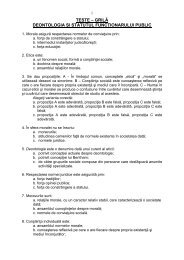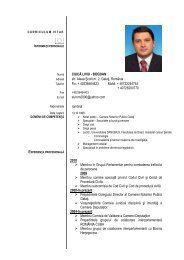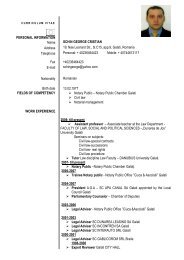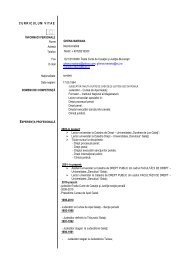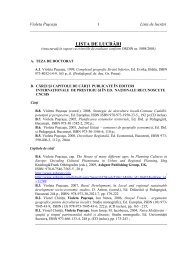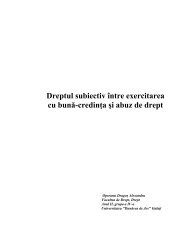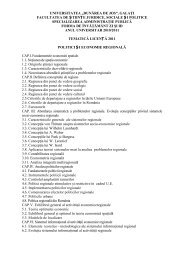Europass CV - Facultatea de Drept - Dunarea de Jos
Europass CV - Facultatea de Drept - Dunarea de Jos
Europass CV - Facultatea de Drept - Dunarea de Jos
You also want an ePaper? Increase the reach of your titles
YUMPU automatically turns print PDFs into web optimized ePapers that Google loves.
C U R R I C U L U M V I T A E<br />
E U R O P E A N<br />
Curriculum Vitae<br />
Personal Information<br />
Name and Surname<br />
Address<br />
Oana Elena Gălăţeanu<br />
Domnească Street , Nr.19, Bl. C<br />
Galaţi, Romania cod 800008<br />
Mobil Phone 0040-752693673<br />
E-mail<br />
oana.galateanu@ugal.ro<br />
Nationality<br />
Romanian<br />
Date of birth 22 August 1974<br />
Sex<br />
Field sought professional /<br />
occupational area<br />
Female<br />
University <strong>Dunarea</strong> <strong>de</strong> <strong>Jos</strong> Galati ;- Faculty of Law, Social and Political / initial<br />
training of human resources in education<br />
Professional Experience<br />
Period<br />
Occupation or position held<br />
2008 – now<br />
Lecturer, Ph.D. - Department of Law<br />
Activities and general responsibilities - Initial training of human resource education at university level courses:<br />
- Insurance Law<br />
- European Union competition law<br />
- Secretarial techniques, communication, public relations and protocol,<br />
- Public Relations<br />
- Member of national committees and local examinations the baccalaureate <strong>de</strong>gree, permanent official<br />
completion and obtaining teaching <strong>de</strong>grees<br />
- Teaching activities to <strong>de</strong>velop and support courses, preparation of seminars, eg<br />
Name and address of employer University <strong>Dunarea</strong> <strong>de</strong> <strong>Jos</strong> Galati ;- Faculty of Law, Social and Political Domneasca Street, Nr. 111,<br />
cod 800201, Galati, Romania<br />
Type or scope of activity<br />
Occupation or position held<br />
© Council of Europe: Common European Framework of Reference for Languages (CEF)<br />
Educational activities for initial training, scientific research<br />
Period 2007 – 2008<br />
Lecturer, Ph.D.
Activities and general responsibilities - Initial training of human resource education at university level courses:<br />
- Criminal law<br />
- Elements of Civil Law<br />
- Environmental Law<br />
- European Union law<br />
- ethics of civil servants<br />
- Commercial Law<br />
- Construction and expansion of the European Union<br />
- Elements of public international law,<br />
Name and address of employer<br />
Type or scope of activity<br />
- Member of national and local committees of the baccalaureate exams, license, appointment as,<br />
finishing and obtaining teaching <strong>de</strong>grees<br />
- teaching activities to <strong>de</strong>velop and support courses, seminars preparation, examination, preparation<br />
of syllabus and discipline cards<br />
- activities and research management<br />
- Participation in various scientific conferences<br />
- Coordination diploma and dissertation works.<br />
University <strong>Dunarea</strong> <strong>de</strong> <strong>Jos</strong> Galati ;- Cross Faculty of Humanities, Public Administration, Economics<br />
and Engineering Garii Street, Nr. 63, cod 800003, Galati, Romania<br />
Educational activities for initial training, scientific research<br />
Period<br />
Occupation or position held<br />
Activities and general responsibilities<br />
Name and address of employer<br />
Type or scope of activity<br />
2007 – 2009<br />
Vice Dean<br />
- Educational activities supporting the preparation and training, preparation of seminars, examination,<br />
drawing programs and spreadsheets analytical discipline<br />
- management and research activities,<br />
- Member of national and local committees of the bacalaureate exams, license, appointment as,<br />
completion and production educational <strong>de</strong>grees;<br />
University <strong>Dunarea</strong> <strong>de</strong> <strong>Jos</strong> Galati ;- Cross Faculty of Humanities, Public Administration, Economics<br />
and Engineering Garii Street, Nr. 63, cod 800003, Galati, Romania<br />
Educational activities for initial training, scientific research<br />
Period<br />
Occupation or position held<br />
2002 – 2007<br />
Assistant Professor Ph.D.<br />
© Council of Europe: Common European Framework of Reference for Languages (CEF)
Activities and general responsibilities<br />
Name and address of employer<br />
- Educational activities for preparation and support of seminars, preparation of syllabus and form of<br />
discipline:<br />
- Environmental Law<br />
- Business Law<br />
- Labour Law<br />
- Criminal Law<br />
- management and research activities,<br />
- Participation in various scientific conferences<br />
- Coordination of the diploma and dissertation works.<br />
University <strong>Dunarea</strong> <strong>de</strong> <strong>Jos</strong> Galati ;- Cross Faculty of Humanities, Public Administration, Economics<br />
and Engineering<br />
Garii Street, Nr. 63, cod 800003, Galati, Romania<br />
Type or scope of activity Educational activities for initial training, scientific research<br />
Occupation or position held<br />
Name and address of employer<br />
Education and Training<br />
Period 1999 – 2002<br />
Prosecutor<br />
Court Prosecutor Galaţi,<br />
Bessarabia Street, Nr. 47, Cod 800002, Galati, Romania<br />
Main subjects gained qualification /<br />
professional skills covered<br />
Period<br />
Name and type of organization that has<br />
provi<strong>de</strong>d education and training<br />
October 2007<br />
The title of Doctor of Law – “Prior criminal complaint procedure Romanian” ;<br />
University „ Alexandru Ioan Cuza” ; Faculty of Law, Carol I Street Avenue, Nr. 11, cod 700506, Iasi,<br />
Romania<br />
Level in national or international<br />
classification<br />
Period<br />
Qualification obtained<br />
Name and type of organization that has<br />
provi<strong>de</strong>d education and training<br />
Level in national or international<br />
classification<br />
ISCED level 6, doctoral studies<br />
1993 – 1997<br />
License Diploma – Specialization Law<br />
University „ Ovidius” Constanta - Faculty of History and Administrative Sciences,<br />
Boulevard Street Mamaia, Nr. 124, co<strong>de</strong> 900527, Constanta, Romania<br />
ISCED level 5<br />
Period 1988 - 1992<br />
© Council of Europe: Common European Framework of Reference for Languages (CEF)
Qualification obtained<br />
Principal subjects / occupational skills<br />
covered<br />
Name and type of organization that has<br />
provi<strong>de</strong>d education and training<br />
Level in national or international<br />
classification<br />
Graduate school - high school diploma<br />
Profile mathematics - physics, general skills, general education subjects<br />
Lyceum „ Vasile Alecsandri”;<br />
Balcescu Street, Nr. 41, cod 800001, Galati, Romania<br />
ISCED level 3<br />
Aptutudini personal and<br />
competent<br />
Mother tongue<br />
Romanian<br />
Other languages<br />
Self-assessment Comprehension Spoken Writing<br />
European level (*) Listening Reading Spoken interaction Spoken production<br />
English Language B1 Proficient user B1 Proficient user B1 Proficient user B1 Proficient user C1 Proficient user<br />
(*) Common European Framework of Reference (CEF) level<br />
Social skills and competences<br />
Organizational skills and competences<br />
Technical Skills and competences<br />
- Strong communication and interpersonal cooperation differentiated<br />
- Cash for teamwork and conflict negotiation<br />
- Capability to work individually with a trial practice in clear, well reasoned and initiative, due to a strict<br />
schedule<br />
- Ability psycho-emotional and investigating social and educational phenomena optimization<br />
- Excellent skills in talking to a wi<strong>de</strong> and varied range of people with different levels of education, to<br />
the transmitter<br />
- Ability to solve practical problems and <strong>de</strong>al with a variety of difficult situations.<br />
- - Strong planning, organization, implementation, monitoring and evaluation of activities: exchange of<br />
experience, training seminars<br />
- - Excellent ability to manage human resources, systems and procedures<br />
- - Ability to create, sustain and promote a cooperative work environment of "gain-gain"<br />
- - the ability to negotiate, establish priorities, <strong>de</strong>legate responsibilities and i<strong>de</strong>ntify viable solutions in<br />
crisis situations<br />
- - Good time management capabilities, organ<br />
- Objectivity in the assessment and <strong>de</strong>cision making<br />
- management skills<br />
- to assume its responsibilities and complete tasks.<br />
© Council of Europe: Common European Framework of Reference for Languages (CEF)
Competenţe şi aptitudini <strong>de</strong> utilizare a<br />
calculatorului<br />
- Microsoft Office, Excel, Power Point, Internet<br />
- Uses common software programs for editing textures, preparation of databases, charts and tables<br />
calculation.<br />
Attachments - List of scientific papers, books and projects / programs un<strong>de</strong>rtaken<br />
© Council of Europe: Common European Framework of Reference for Languages (CEF)
APPENDIX<br />
LIST OF SCIENTIFIC AND PROJECTS OF BOOKS<br />
I. PhD THESIS<br />
Oana Galateanu, „ Prior criminal complaint procedure Romanian” , Univ. Al.I.Cuza Iasi, Fac. Of Law, supervisor: Professor. Emeritus Gregory Theodoru. Presentation of thesis: November 2006<br />
II. BOOKS<br />
„ Prior criminal complaint procedure Romanian” , 150 pag., Ed University Foundation. <strong>Dunarea</strong> <strong>de</strong> <strong>Jos</strong> , ISBN 978-973-627-422-0;<br />
III<br />
SCIENTIFIC ARTICLES<br />
1. „ Rip off. Theoretical and practical aspects” ;, Rev.” Annals of the Faculty of Law „ ;-Fascicle XXII of Univ.Dunărea <strong>de</strong> <strong>Jos</strong> Galati, Published by University Press;<br />
2. „Some aspects of the forms it may take a plurality of crime and crime unit in accordance with the provisions of existing penal laws in Romania and Rep.Moldova” ;REV. „ Annals of the Faculty of Law” -Fascicle XXII of<br />
Univ. <strong>Dunarea</strong> <strong>de</strong> <strong>Jos</strong> Galati, Galati published by University Press<br />
3. „ Elements of comparative law on some aspects of the institution prior complaint „ , the Rev. Law Chisinau<br />
4. „ Plurality of crime and crime unit in the criminal law of the Republic of Moldova” , Journal of Criminal Law no.2/2009;<br />
5. „Reflections on sanctioning regime applicable to minors in criminal matters” in the volume of the International Conference „ Exploration, Education And Progress In The Third Millennium” ;, Faculty of Law Galati , 2009<br />
April 24-25, 25/10/2009;<br />
6. „Freedom of movement, one of the fundamental human rights „ , the International Symposium „Legal Institutions in the contemporary context of Romania in the European Union „ III edition, Romanian-American<br />
University, Bucharest, October 2009;<br />
7. „Consi<strong>de</strong>rations on the principle of abandoning one of the prosecution proposed changes to current provisions of criminal procedure „ , the volume of the second International Conference „ Exploration, Education And<br />
Progress In The Third Millennium” , the Fac.<strong>de</strong> Juridical Sciences, Social and Political, April 2010;<br />
8. „Consi<strong>de</strong>rations of „;plea bargaining agreement” in criminal law „ , the volume of the International Conference „ The Role and Place of Law in Society Based on Knowledge” at the Faculty of Juridical Sciences,<br />
University of Tg.Jiu C-tin Brancusi, April 16 to 17 2010;<br />
9. „Competition Council work internationally” rev .” Annals of the Faculty of Law „ -Fascicle XXII Univ.Dunărea <strong>de</strong> <strong>Jos</strong> Galati, Galati published by University Press<br />
© Council of Europe: Common European Framework of Reference for Languages (CEF)
U<br />
N<br />
D<br />
E<br />
R<br />
S<br />
T<br />
A<br />
N<br />
D<br />
I<br />
N<br />
G<br />
S<br />
P<br />
E<br />
A<br />
K<br />
I<br />
N<br />
G<br />
W<br />
R<br />
I<br />
T<br />
I<br />
N<br />
G<br />
Listening<br />
Reading<br />
Spoken<br />
interaction<br />
Spoken<br />
production<br />
Writing<br />
A1 A2 B1 B2 C1 C2<br />
I can un<strong>de</strong>rstand familiar words and very<br />
basic phrases concerning myself, my<br />
family and immediate concrete<br />
surroundings when people speak slowly<br />
and clearly.<br />
I can un<strong>de</strong>rstand familiar names, words<br />
and very simple sentences, for example<br />
on notices and posters or in catalogues.<br />
I can un<strong>de</strong>rstand phrases and the<br />
highest frequency vocabulary related to<br />
areas of most immediate personal<br />
relevance (e.g. very basic personal and<br />
family information, shopping, local area,<br />
employment). I can catch the main point<br />
in short, clear, simple messages and<br />
announcements.<br />
I can read very short, simple texts. I can<br />
find specific, predictable information in<br />
simple everyday material such as<br />
advertisements, prospectuses, menus<br />
and timetables and I can un<strong>de</strong>rstand<br />
short simple personal letters.<br />
I can interact in a simple way provi<strong>de</strong>d I can communicate in simple and routine<br />
the other person is prepared to repeat or tasks requiring a simple and direct<br />
rephrase things at a slower rate of exchange of information on familiar<br />
speech and help me formulate what I'm topics and activities. I can handle very<br />
trying to say. I can ask and answer simple short social exchanges, even though I<br />
questions in areas of immediate need or can't usually un<strong>de</strong>rstand enough to<br />
on very familiar topics.<br />
keep the conversation going myself.<br />
I can use simple phrases and sentences<br />
to <strong>de</strong>scribe where I live and people I<br />
know.<br />
I can write a short, simple postcard, for<br />
example sending holiday greetings. I can<br />
fill in forms with personal <strong>de</strong>tails, for<br />
example entering my name, nationality<br />
and address on a hotel registration form.<br />
I can use a series of phrases and<br />
sentences to <strong>de</strong>scribe in simple terms<br />
my family and other people, living<br />
conditions, my educational background<br />
and my present or most recent job.<br />
I can write short, simple notes and<br />
messages. I can write a very simple<br />
personal letter, for example thanking<br />
someone for something.<br />
I can un<strong>de</strong>rstand the main points of<br />
clear standard speech on familiar<br />
matters regularly encountered in work,<br />
school, leisure, etc. I can un<strong>de</strong>rstand<br />
the main point of many radio or TV<br />
programmes on current affairs or topics<br />
of personal or professional interest<br />
when the <strong>de</strong>livery is relatively slow and<br />
clear.<br />
I can un<strong>de</strong>rstand texts that consist<br />
mainly of high frequency everyday or<br />
job-related language. I can un<strong>de</strong>rstand<br />
the <strong>de</strong>scription of events, feelings and<br />
wishes in personal letters.<br />
I can <strong>de</strong>al with most situations likely to<br />
arise whilst travelling in an area where<br />
the language is spoken. I can enter<br />
unprepared into conversation on topics<br />
that are familiar, of personal interest or<br />
pertinent to everyday life (e.g. family,<br />
hobbies, work, travel and current<br />
events).<br />
I can connect phrases in a simple way<br />
in or<strong>de</strong>r to <strong>de</strong>scribe experiences and<br />
events, my dreams, hopes and<br />
ambitions. I can briefly give reasons and<br />
explanations for opinions and plans. I<br />
can narrate a story or relate the plot of a<br />
book or film and <strong>de</strong>scribe my reactions.<br />
I can write simple connected text on<br />
topics which are familiar or of personal<br />
interest. I can write personal letters<br />
<strong>de</strong>scribing experiences and<br />
impressions.<br />
I can un<strong>de</strong>rstand exten<strong>de</strong>d speech and<br />
lectures and follow even complex lines<br />
of argument provi<strong>de</strong>d the topic is<br />
reasonably familiar. I can un<strong>de</strong>rstand<br />
most TV news and current affairs<br />
programmes. I can un<strong>de</strong>rstand the<br />
majority of films in standard dialect.<br />
I can read articles and reports<br />
concerned with contemporary problems<br />
in which the writers adopt particular<br />
attitu<strong>de</strong>s or viewpoints. I can un<strong>de</strong>rstand<br />
contemporary literary prose.<br />
I can interact with a <strong>de</strong>gree of fluency<br />
and spontaneity that makes regular<br />
interaction with native speakers quite<br />
possible. I can take an active part in<br />
discussion in familiar contexts,<br />
accounting for and sustaining my views.<br />
I can present clear, <strong>de</strong>tailed <strong>de</strong>scriptions<br />
on a wi<strong>de</strong> range of subjects related to<br />
my field of interest. I can explain a<br />
viewpoint on a topical issue giving the<br />
advantages and disadvantages of<br />
various options.<br />
I can write clear, <strong>de</strong>tailed text on a wi<strong>de</strong><br />
range of subjects related to my<br />
interests. I can write an essay or report,<br />
passing on information or giving<br />
reasons in support of or against a<br />
particular point of view. I can write<br />
letters highlighting the personal<br />
significance of events and experiences.<br />
I can un<strong>de</strong>rstand exten<strong>de</strong>d speech even<br />
when it is not clearly structured and<br />
when relationships are only implied and<br />
not signalled explicitly. I can un<strong>de</strong>rstand<br />
television programmes and films without<br />
too much effort.<br />
I can un<strong>de</strong>rstand long and complex<br />
factual and literary texts, appreciating<br />
distinctions of style. I can un<strong>de</strong>rstand<br />
specialised articles and longer technical<br />
instructions, even when they do not<br />
relate to my field.<br />
I can express myself fluently and<br />
spontaneously without much obvious<br />
searching for expressions. I can use<br />
language flexibly and effectively for<br />
social and professional purposes. I can<br />
formulate i<strong>de</strong>as and opinions with<br />
precision and relate my contribution<br />
skilfully to those of other speakers.<br />
I can present clear, <strong>de</strong>tailed <strong>de</strong>scriptions<br />
of complex subjects integrating subthemes,<br />
<strong>de</strong>veloping particular points<br />
and rounding off with an appropriate<br />
conclusion.<br />
I can express myself in clear, wellstructured<br />
text, expressing points of<br />
view at some length. I can write about<br />
complex subjects in a letter, an essay or<br />
a report, un<strong>de</strong>rlining what I consi<strong>de</strong>r to<br />
be the salient issues. I can select a style<br />
appropriate to the rea<strong>de</strong>r in mind.<br />
I have no difficulty in un<strong>de</strong>rstanding any<br />
kind of spoken language, whether live or<br />
broadcast, even when <strong>de</strong>livered at fast<br />
native speed, provi<strong>de</strong>d. I have some<br />
time to get familiar with the accent.<br />
I can read articles and reports<br />
concerned with contemporary problems<br />
in which the writers adopt particular<br />
attitu<strong>de</strong>s or viewpoints. I can un<strong>de</strong>rstand<br />
contemporary literary prose.<br />
I can take part effortlessly in any<br />
conversation or discussion and have a<br />
good familiarity with idiomatic<br />
expressions and colloquialisms. I can<br />
express myself fluently and convey finer<br />
sha<strong>de</strong>s of meaning precisely. If I do<br />
have a problem I can backtrack and<br />
restructure around the difficulty so<br />
smoothly that other people are hardly<br />
aware of it.<br />
I can present a clear, smoothly-flowing<br />
<strong>de</strong>scription or argument in a style<br />
appropriate to the context and with an<br />
effective logical structure which helps<br />
the recipient to notice and remember<br />
significant points.<br />
I can write clear, smoothly-flowing text<br />
in an appropriate style. I can write<br />
complex letters, reports or articles which<br />
present a case with an effective logical<br />
structure which helps the recipient to<br />
notice and remember significant points.<br />
I can write summaries and reviews of<br />
professional or literary works.<br />
© Council of Europe: Common European Framework of Reference for Languages (CEF)


